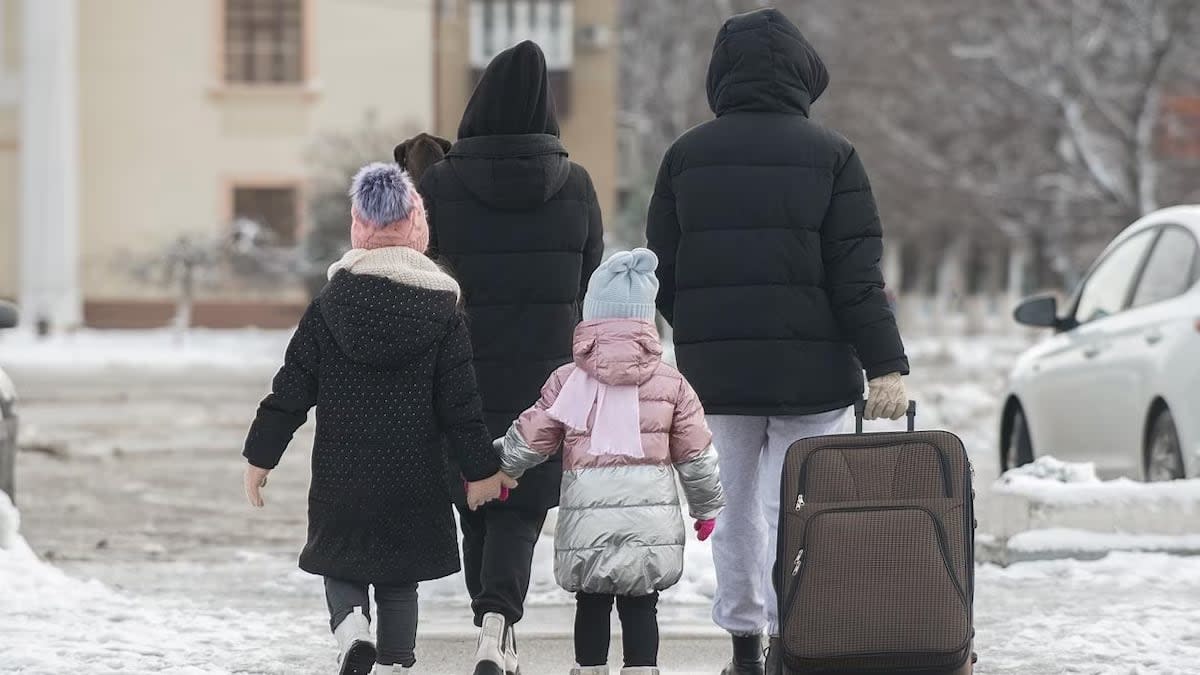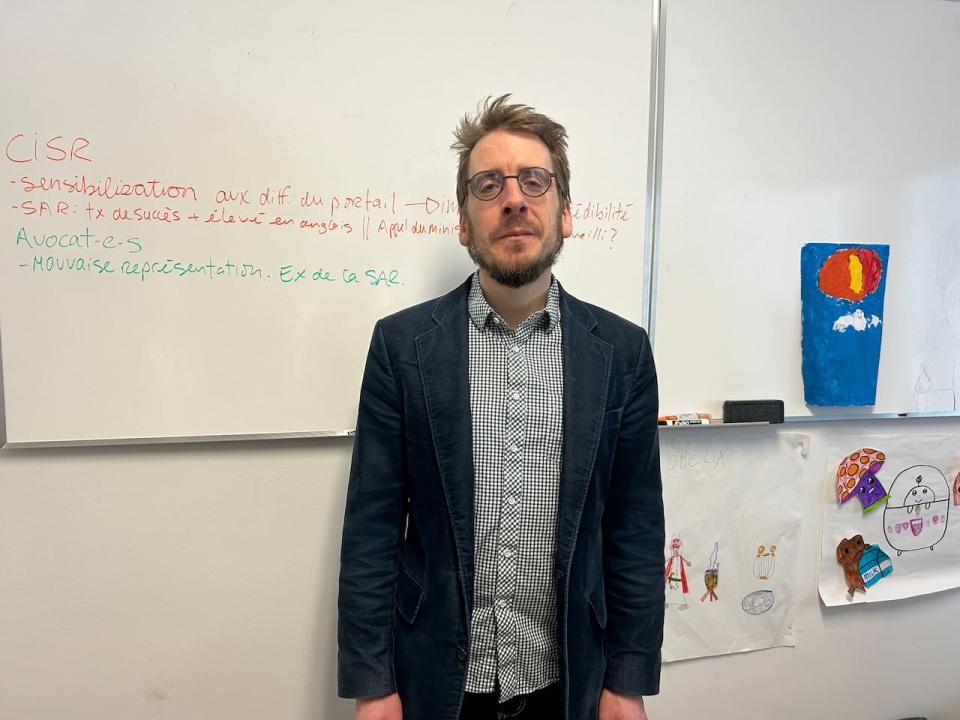Quebec asks Ottawa for $1B to cover rising costs of asylum seekers

- Oops!Something went wrong.Please try again later.
- Oops!Something went wrong.Please try again later.
The Quebec government is calling on Ottawa to reimburse $1 billion — the amount the province says it has spent to welcome a growing number of asylum seekers.
At a news conference Tuesday, Immigration Minister Christine Fréchette, Education Minister Bernard Drainville, Social Solidarity Minister Chantal Rouleau and Jean-François Roberge, minister of Canadian Relations, said the increase in new arrivals may soon become untenable for Quebec's education network and social services.
The province says it spent $576.9 million in 2023 on social services to support migrants. It says that is on top of the $470 million it spent in 2021 and 2022.
As of Dec. 31, 55 per cent of asylum seekers currently residing in Canada — 160,651 people out of 289,047 — are in Quebec.
"This is completely unreasonable," Fréchette said. "Our capacity to provide services to asylum seekers has limits."
The province is asking the federal government to relocate asylum seekers more equitably throughout Canada and to slow the influx of asylum seekers entering the country by tightening Canadian visa policies.
It also wants Ottawa to close loopholes that it says would allow criminal groups to infiltrate Canada and to reimburse the province for all costs linked to welcoming asylum seekers from 2021 to 2023.
Roberge, who is the minister responsible for relations with the rest of the country, said the federal government's "passive attitude" toward Quebec's reception of asylum seekers "must absolutely end."
Fréchette pointed to the four Atlantic provinces, which together received a total of 380 asylum seekers in 2023, compared to Quebec's 65,570.
A spokesperson for Quebec's immigration minister said since Roxham Road closed in March 2023, the five main countries of origin of asylum seekers who stayed in the province are Mexico, India, Haiti, the Democratic Republic of Congo and Senegal.
The amount Quebec says it has spent on last-resort financial assistance for asylum seekers between 2022 and 2023 went from $163 million to $370 million — a 127 per cent increase.
In January, Quebec said it recorded a spike in the number of requests for social assistance, which it attributed to the increase in asylum seekers.
Data from the Ministry of Labour, Employment and Social Solidarity shows that requests for social assistance made by asylum seekers increased by 27 per cent at the start of 2024 compared to the same period of the previous year.
In the past couple of years, requests for social assistance by asylum seekers have grown from 27,099 in October 2022 to 43,174 in October 2023, according to ministry data.
So far, discussions with Ottawa haven't led to an agreement. The federal government transferred $100 million to Quebec three weeks ago to support a program to house migrants, but Fréchette said the injection is "clearly insufficient."
Increase in asylum seekers weighing down school network
Even if the federal government reimburses Quebec, the ministers say money wouldn't solve the root of the problem.
Although Quebec is obligated to provide instruction to asylum seekers who are minors, the education minister says the province is reaching a "breaking point," where it cannot rule out the possibility that educating them would be unfeasible.
"We are approaching a point where we will not be able to serve people who are already on the Quebec territory," Drainville said. "What Quebec has done to educate these asylum-seeking children in recent years is exceptional, but now, it can't continue like this."
There are 1,200 French-language classes for newcomers in Quebec, which is the equivalent of 52 elementary schools, Drainville said. Montreal's French school service centre has been receiving 80 new registrations per week.
At this rate, he says the province would need to open three to four new elementary schools by the end of the school year just to teach young asylum seekers French.
"The risk is that we will not be able to offer them the education they are entitled to," Drainville told reporters. "We're hoping something can be done to bring down the level, and we're calling on the federal government to take its responsibilities."
What is most challenging for Montreal's French school service centre is recruiting teachers in the middle of the school year to meet the needs of additional students, says the centre's director of services, Mathieu Desjardins.
There are more than 6,100 students enrolled in elementary and high school French-languages classes of the Centre de services scolaire de Montréal, he said. Previously, the total number of those students did not exceed 5,400.
"We are still managing to recruit new teachers, but of course, they are teachers who are not legally qualified," he said. "Resorting to non-legally qualified teachers is one of the solutions we currently have to respond to the teacher shortage."
Prime Minister Justin Trudeau said Tuesday the federal government recognizes how generously Quebecers have been welcoming asylum seekers.
"The federal government was there with hundreds of millions of dollars, and we will continue to work hand in hand with Quebec to ensure that we can move forward in the right way," Trudeau said at a news conference in Vancouver.
"The important thing, obviously, is to reassure everyone from one end of this country to the other that we have a functional, rigorous immigration system where the rules are being followed."
Announcement 'damaging' for asylum seekers, advocate says
In recent weeks, public discourse in Quebec has revolved around the pressure immigration puts on housing and social services.
But strains on government services have "more complex explanations than only the arrival of newcomers," said Louis-Philippe Jannard, the protection stream co-ordinator of the Table de concertation des organismes au service des personnes réfugiées et immigrantes (TCRI) — a group of over 150 organizations supporting newcomers

Louis-Philippe Jannard is the protection stream co-ordinator of the Table de concertation des organismes au service des personnes réfugiées et immigrantes (TCRI) — a group of over 150 organizations supporting newcomers. (Sara Eldabaa/CBC)
"It's very damaging for asylum seekers to be scapegoated as they have been this morning by the Quebec government," said Jannard.
In particular, he says the government suggesting that newcomers were overburdening the education network was "below the belt."
"It's been documented in the past decades as well that there has been some underfunding of the education system," he said, alluding to numerous reports of teachers leaving the profession after a couple of years because of poor working conditions.
"The so-called 'breaking point' — I don't think it's caused by the arrival of asylum seekers," Jannard said.

